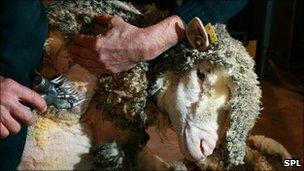Farmers happy at wool price increases
- Published

The British Wool Marketing Board wants to keep basic farming skills like shearing alive
For years, farmers have had to contend with low wool prices - but at last they are on the rise.
BBC Scotland reporter Gillian Sharpe went to a shearing course run by the British Wool Marketing Board (BWMB) on a farm near Crawford in South Lanarkshire to gauge reaction.
Inside a large shed, a short way from the other farm buildings, sheep are being funnelled through a narrow, fenced channel before being picked out for shearing.
It is a very physical process - the idea is for shearers to use the movement of their bodies to keep control of the animal at all times.
This was a beginners' shearing course. Some of the participants were the sons or daughters of farmers who wanted to brush up on their skills, while others were complete beginners.
One of the tutors, BWMB shearing manager Colin MacGregor, said it was "important" to keep basic farming skills like shearing alive as often there was not time to teach them on the farm themselves.
He added: "If we don't keep these basic skills going, there's a danger that we lose them and then we're going to be totally reliant on outside labour and contractors."
Happier farmers
For years the price of wool has been low and coincided with low lamb prices.
A kilogram of wool now costs twice as much as it did last year and farmers in Australia - which is home to the world's main wool producer - believe that rising demand from China and India for wool for use in clothing has prompted the rise.
Hugh Blythe, the BWMB south of Scotland representative, believes the improved wool price will make some difference.
He explained: "It's not going to transform their businesses because sheep farmers get far more out of the meat value of their lambs than they do for their wool - so it's a bit of a sideline.
"But the fact that it's more than covering the cost of shearing the wool, the fact that it's going to make a useful contribution to the farm budget, is very welcome. It makes people feel happier about the job."
Someone who is already enjoying what she is doing is 18-year-old Kelly Blackwood, a part-time shepherd who was attending the course.
She said: "I love the job, working with livestock, working with sheep. I just love being out on the hills by yourself just working with them. It's the best livelihood."
Rising wool prices could help make that a more viable prospect.
Mr Blythe said: "It really comes down to supply and demand. There are less sheep in this country and all round the world.
"All the wool-producing countries of the world have got roughly half the number of sheep they had at their peak."
But while rising wool prices might be good for farmers, what about manufacturers and consumers who want to create or buy things made from wool?
Mr Blythe added: "Although I have some sympathy, I'm seeing my costs in life and in business going up a lot as well and I don't like it.
"I think there is room for a bit of a lift in raw material prices. It's really a small part of the total cost."
- Published14 July 2010